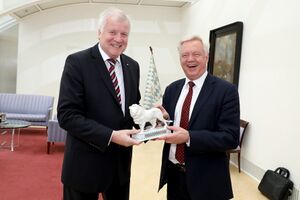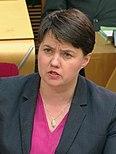Justicial State
State & overseas territory legislatures
Greater Morwall
Government (47)
Social Democratic and Co-operative Party (47)
Supported by (5)
Estmerish Section of the Workers' International (4)
Hope Not Hate (1)
Opposition (49)
Sotirian Democratic Union (18)
Reform Party (7)
Greens (6)
Vox Estmere (6)
Residents' Assocation (6)
future.es (3)
Estmere First (2)
Reason Party (1)
Flurland
Government (158)
Sotirian Democratic Union (158)
Opposition (155)
Social Democratic and Co-operative Party (60)
Reform Party (21)
Greens (21)
Estmere First (15)
Liberty Party (12)
Vox Estmere (10)
Independents (10)
Estmerish Section of the Workers' International (3)
Flurian Language League (3)
Wealdland
Government (188)
Social Democratic and Co-operative Party (137)
Party of the Swathish (51)
Supported by (6)
Aldman Democratic Alliance (6)
Opposition (161)
Sotirian Democratic Union (106)
Reform Party (23)
Estmerish Section of the Workers' International (11)
Greens (10)
Estmere First (9)
Hope Not Hate (2)
Kingsport
Government (32)
Kingsport Socialist Co-operative Party (17)
Kingsport Alliance for Change (9)
The Kingsport Alternative (6)
Opposition (23)
Kingsport United (13)
Sotirian Democratic Union (8)
Kabuese Section of the Workers' International (2)
St Roberts and Fleming
Government (30)
Sotirian Social Democratic Party (30)
Supported by (4)
Integration with Estmere Party (4)
Opposition (33)
Social Democratic Liberation Party (19)
Social Liberal Democratic Party (12)
St Roberts and Fleming Section of the Workers' International (2)
List of Estmerish governments
| President | Head of government | Governing parties | Government | |||||
|---|---|---|---|---|---|---|---|---|
| 1938 | Wolfgar Godfredson | Lawrence Montgomerie | SPP | NDP | ULP | RR | Montgomerie ministry | |
| 1939 | Hugo Gilbert | SPP | NDP | ULP | RR | Gilbert ministry | ||
| 1941 | SPP | NDP | RR | |||||
| 1941 | Vincent Holmes | SDCP | First Holmes ministry | |||||
| 1945 | SDCP | RL | ESWI | Second Holmes ministry | ||||
| 1949 | Richard Moore | Moore ministry | ||||||
| 1949 | Theodore Spencer | SPP | NDP | First Spencer ministry | ||||
| 1953 | Louis de Neville | Fabian Young | SDCP | ULP | RL | Young ministry | ||
| 1955 | Theodore Spencer | SPP | NDP | Second Spencer ministry | ||||
| 1959 | Third Spencer ministry | |||||||
| 1960 | SDU | |||||||
| 1961 | Guian FitzHubert | First FitzHubert ministry | ||||||
| 1963 | Anthony Atkinson | SDU | ULP | Second FitzHubert ministry | ||||
| 1965 | Harry Hamilton | Harry Hamilton ministry | ||||||
| 1966 | Isaac Mosset | SDU | RR | First Mosset ministry | ||||
| 1967 | Kenneth Lawson | SDCP | ULP | ESWI | RL | First Lawson ministry | ||
| 1968 | Milo Morris | |||||||
| 1971 | SDCP (minority) | Second Lawson ministry | ||||||
| 1972 | William Prentice | Prentice ministry | ||||||
| 1973 | David Armstrong | First Armstrong ministry | ||||||
| 1973 | SDCP | ULP | RL | Second Armstrong ministry | ||||
| 1976 | Isaac Mosset | SDU (caretaker) | Second Mosset ministry | |||||
| 1977 | SDU (minority) | Third Mosset ministry | ||||||
| 1978 | Rufus Wilson | |||||||
| 1980 | Michael Lowe | Lowe ministry | ||||||
| 1981 | Robert Reynolds | Reform | First Reynolds ministry | |||||
| 1983 | Calvin Wright | |||||||
| 1984 | Reform (minority) | Second Reynolds ministry | ||||||
| 1988 | Third Reynolds ministry | |||||||
| 1990 | Melissa Smith | Smith ministry | ||||||
| 1992 | Charles Phillips | SDU (minority) | First Phillips ministry | |||||
| 1993 | David Russell | |||||||
| 1996 | Second Phillips ministry | |||||||
| 1997 | Richard Hamilton | SDU | EF | Richard Hamilton ministry | ||||
| 1998 | John Stephenson | SDU (minority) | Stephenson ministry | |||||
| 1999 | Heidi Reid | Reform (minority) | First Reid ministry | |||||
| 2003 | Toby Brown | Reform | SDCP | Second Reid ministry | ||||
| 2005 | Reform (minority) | Third Reid ministry | ||||||
| 2007 | Reform | SDU | Fourth Reid ministry | |||||
| 2008 | Alice Roberts | Daniel Hawkins | First Hawkins ministry | |||||
| 2008 | Reform (minority) | Second Hawkins ministry | ||||||
| 2012 | Matthew Dawson | SDU (minority) | First Dawson ministry | |||||
| 2015 | Alan Baskerville | Baskerville interim ministry | ||||||
| 2016 | Richard Graham | First Graham ministry | ||||||
| 2016 | SDU | Reform | Second Graham ministry | |||||
| 2018 | Reginald Wilton-Smyth | First Wilton-Smyth ministry | ||||||
| 2018 | Second Wilton-Smyth ministry | |||||||
| 2021 | Zoe Halivar | SDCP (minority) | Halivar ministry | |||||
1982 Shoreham by-election
| |||||||||||||||||||||||||||||||||||||||||
Shoreham parliamentary seat | |||||||||||||||||||||||||||||||||||||||||
|---|---|---|---|---|---|---|---|---|---|---|---|---|---|---|---|---|---|---|---|---|---|---|---|---|---|---|---|---|---|---|---|---|---|---|---|---|---|---|---|---|---|
| |||||||||||||||||||||||||||||||||||||||||
| |||||||||||||||||||||||||||||||||||||||||
A Shoreham by-election was held on 11 July 1982. The by-election was caused by the death of David Johnson on 7 May 1982, who had been elected on behalf of the Sotirian Democratic Union as the Member of Parliament for Shoreham less than a year prior.
The seat was traditionally an SDU-Radical Liberal (and later Reform Party) marginal, but the approval of a new nuclear power plant near the seat (approved by the previous SDU government and upheld by the new Reform government) majorly shifted the balance of power in the seat. The local anti-nuclear movement became a major factor, and the power plant itself became a major issue in the campaign. The Greens were able to flex their anti-nuclear credentials and act as a protest vote for both liberal and conservative voters in the seat.
The by-election was notable in that it saw the Greens win their first parliamentary constituency, catapulting them from extra-parliamentary opposition. The result was an embarassment for the SDU, and to a lesser extent to the governing Reform Party. The power plant's construction was paused indefinitely, and the seat was ultimately gained by the Reform Party in the next election, with the Greens in fourth place.
Candidates
Campaign
Results
| Party | Candidate | Votes | % | ± | |
|---|---|---|---|---|---|
| Greens | Harry Peterson | 10,522 | 34.8 | + 32.9 | |
| Reform | Andrew Times | 6,410 | 21.2 | - 18.0 | |
| SDU | Gregory Houchingdon | 6,289 | 20.8 | - 20.9 | |
| SDCP | Anthony Burgess | 5,261 | 17.4 | + 1.7 | |
| Majority | 0,000 | 0.0 | - 0.0 | ||
| Turnout | 30,236 | 00.0 | + 0.0 | ||
| Greens gain from Sotirian Democratic Union | Swing | ||||
10,522 34.8% 6,410 21.2% 6,289 20.8% 5,261 17.4% 1,754 5.8%
41.7%
39.2%
15.7%
1.9%
1.5%
Aftermath
2021 Reform Party leadership election
| |||||||||||||
| Turnout | 61.4% ( | ||||||||||||
|---|---|---|---|---|---|---|---|---|---|---|---|---|---|
| |||||||||||||
| |||||||||||||
The 2021 Reform Party leadership election was held between 22 July and 4 August 2021 to elect a new leader of the Reform Party, after previous leader Esther Bennett resigned following the poor performance of the party in the 2021 general election.
A number of party members initially made known that they were interested in standing for the leadership. Former cabinet ministers Andrew Sinclair, Roseline Perrier, Nicola Ramsey and Marjanne Sudermann all put themselves forward for the leadership. On 12 July, party backbencher Jim Reynolds announced his intention to stand for the leadership as a unity candidate. Sinclair, Ramsey and Perrier withdrew and endorsed Reynolds.
Nominations closed on 18 July, with Reynolds and Sudermann as the only candidates. The final ballot saw Reynolds secure 72.8% of votes from the party membership, and he was declared as the new leader of the party on 4 August.
Background
The Reform Party had been led by Esther Bennett since her election as leader in October 2014. Bennett had succeeded former Prime Minister Daniel Hawkins. She sought to lead the party back to power in the 2016 general election, but was instead forced to sign a coalition deal with the Sotirian Democratic Union, her party's historic rivals.
Bennett served as Deputy Prime Minister and Foreign Secretary from 2016 until 2021, with a number of other high-ranking Reform politicians serving in a number of roles in the cabinet, first under Richard Graham and then under Reginald Wilton-Smyth. Her party experienced a poor result in the 2018 election, and in the 2021 election Bennett lost her seat of Tolbury Outer. The party saw a 9.6% swing against them in the party preference vote, and a 6.8% swing against them in the constituency vote. The party lost 57 seats, and the party's tepid reponse to the gambled pensions scandal was partially blamed for this.
Bennett resigned as leader. Deputy leader Andrew Sinclair became acting leader, while party president Charles Crampton became responsible for organising a leadership election.
Procedure
The procedure for a leadership election is outlined in the party's Governing Directives. When Esther Bennett announced her intention to stand down as leader, the Executive Committee - chaired by Party President Charles Crampton - was called to action in order to establish a timetable. The Committee met on 5 June, and officially released the timetable on 7 June.
Elections for Reform Party leadership positions use preferential voting, with voters able to rank candidates in order of their preference. According to the Governing Directives, the electorate for internal elections is comprised of all who held party membership at the time nominations open, establishing an effective cut-off date for membership in this election of 24 June.
The directives also outline the requirements for candidates. They must be a federal MP, and have to recieved nominations from either 5% (2) of the parliamentary Reform Party, 10% (7) of the party's (or sister party's) elected representatives across the constituent entities, or more than 1,000 ordinary party members.
Timetable
Key dates in the leadership election are listed below:
| 28 May | Esther Bennett steps down |
| 7 June | Executive Committee sets timetable |
| 25 June | Nominations open |
| 18 July | Nominations close |
| 22 July | Voting begins |
| 3 August | Voting ends |
| 4 August | Results announced |
Campaign
The first candidate to self-nominate for the position was Roseline Perrier, who announced her intention on 2 July. As former Euclean Secretary, Perrier said that her leadership would focus on "open, liberal leadership" and a "firm committment" to the Euclean Community. On 3 July, Marjanne Sudermann announced her candidacy. Sudermann is an ethnic Aldman, arguably one of the most high-profile Aldmans in Estmerish politics, and former Equalities Secretary. She claimed that protecting the rights of linguistic and ethnic minorities would form a key pillar to her leadership.
Party deputy leader and former Justice Secretary Andrew Sinclair put himself forward on 4 July, as the "moderate, free-thinking" alternative with "experience to spare". He was followed by Nicola Ramsey, the former Labour and Business Secretary, on 7 July, who had previously explored Reform's options with entering coalition with the SDCP, and is considered to be on the party's left.
On 12 July, Jim Reynolds announced his intention to seek the leadership. As the son of party founder Robert Reynolds and as Defence Secretary in the Second Reid ministry, Reynolds had been widely seen as a potential leader for some time. He announced his intention to "unite the party", by "returning to its roots". After he announced his intention to stand, Sinclair, Perrier and Ramsey all withdrew from the race on the same day and announced their support for Reynolds. Sudermann remained in the race.
Both candidates recieved enough nominations from MPs by 13 July. Reynolds had recieved more nominations than Sudermann by the close of nominations on 18 July.
Reynolds was considered the frontrunner among the final two candidates, having more name recognition and being the only candidate to have served in a Reform-led government. Sudermann was considered to be from the party's left, as a social liberal and a progressive, while Reynolds was seen as a party centrist and a unifying figure. Both candidates have criticised the party's coalition with the Sotirian Democratic Union; but Reynolds' criticism was seen as more authentic as, unlike Sudermann, he did not serve in Wilton-Smyth's government.
Candidates
Declared
| Candidate | Most recent position | Constituency | Announced | Campaign logo | |
|---|---|---|---|---|---|
| Jim Reynolds | Secretary of State for Defence (2003-2007) |
Hazelham and Grenfield | 12 July | 
| |
| Marjanne Sudermann | Secretary of State for Equalities (2018-2021) |
Wealdland List | 3 July | 
| |
Withdrawn
| Candidate | Most recent position | Constituency | Announced | Withdrew | Campaign logo |
|---|---|---|---|---|---|
| Andrew Sinclair | Secretary of State for Justice (2016-2021) |
Colton North | 4 July | 12 July (endorsed Reynolds) |

|
| Nicola Ramsey | Secretary of State for Labour, Business and Social Dialogue (2018-2021) |
Driscoll and the Borders | 7 July | 12 July (endorsed Reynolds) |
|
| Roseline Perrier | Secretary of State for the Euclean Community (2017-2021) |
Flurland List | 2 July | 12 July (endorsed Reynolds) |

|
Declined
- Willie Woodroofe, Secretary of State for Commerce and International Trade from 2018 to 2021 (endorsed Reynolds)
- Steve Hooten, Secretary of State for Energy and Natural Gas from 2018 to 2021 (endorsed Reynolds)
Endorsements
Jim Reynolds
- Melissa Smith, Prime Minister from 1990 to 1992
- Willie Woodroofe, Secretary of State for Commerce and International Trade from 2018 to 2021
- Steve Hooten, Secretary of State for Energy and Natural Gas from 2018 to 2021
- Andrew Sinclair, Secretary of State for Justice from 2016 to 2021
- Nicola Ramsey, Secretary of State for Labour, Business and Social Dialogue from 2018 to 2021
- Roseline Perrier, Secretary of State for the Euclean Community from 2017 to 2021
- Abigail Kynd, journalist at The Standard
Marjanne Sudermann
- Matt LePonde, journalist at The Standard
Results
| Candidate | Votes | % | ||
|---|---|---|---|---|

|
68,476 | 72.8 | ||

|
Marjanne Sudermann | 25,585 | 27.2 | |
| Total | 94,061 | Turnout | 61.4 | |
Education in Estmere
| Age | Compulsorary? | Year | School | Division | Final exam | |||
|---|---|---|---|---|---|---|---|---|
| 3 to 4 | No | Nursery | None | |||||
| 4 to 5 | Yes | Preparatory | Primary | Infant | ||||
| 5 to 6 | Year 1 | |||||||
| 6 to 7 | Year 2 | Basic Comprehension Exams | ||||||
| 7 to 8 | Year 3 | Junior | None | |||||
| 8 to 9 | Year 4 | |||||||
| 9 to 10 | Year 5 | |||||||
| 10 to 11 | Year 6 | Advanced Comprehension Exams Eleven+ | ||||||
| 11 to 12 | Year 7 | Comprehensive | Grammar | Technical | Lower senior | None | ||
| 12 to 13 | Year 8 | |||||||
| 13 to 14 | Year 9 | |||||||
| 14 to 15 | Year 10 | Upper senior | ||||||
| 15 to 16 | Year 11 | Basic Certificates | Vocational Qualifications Level 1 | |||||
| 16 to 17 | No | Year 12 | College | Lower collegiate | None | |||
| 17 to 18 | Year 13 | Upper collegiate | Advanced Certificates | Vocational Qualifications Level 2 | ||||
Alte Bruderschaft

The Alte Bruderschaft (Estmerish: Old Brotherhood) is a term often used to describe the special relationship between Estmere and Werania, in the form of the close culutral, diplomatic, economic, political and military relations that the two nations share. Both countries share a historic relationship, and the two have shared an alliance in one form or another since Weranian Unification; as such, the two have participated jointly in a number of conflicts, such as the War of the Triple Alliance, the Great War, the Solarian War, the Kirenian-Weranian War and the Tsabaran Civil War.
The term was first coined by Weranian foreign minister Adolf Ritter von Kral in 1883, following the peaceful resolution of the Lake Edward dispute. It was used more broadly in the run up to the Great War The term has subsequently been used by leaders and commentators from both countries.
Historically, the bruderschaft has greatly influenced Euclea. Starting with Estmerish support for the unification of Werania, the relationship and alliance between the two countries would later serve as the primary anchor around which the Grand Alliance was built. The relationship was instrumental in Werania's accession to the Euclean Community, and within the EC the two countries have repeatedly acted together for their mutual interest.
The strength of the Alte Bruderschaft has fluctuated over time, and its political component is seen as dependent on the leadership of the two countries. There have been a number of particularly close relationships among the heads of government of the two countries, such as between Viktor Beer-Hofmann and Fabian Young, between Ludolf Ostermann and Robert Reynolds, between Heidi Reid and Rasa Šimonytė, and recently between Reginald Wilton-Smyth and Otto von Hößlin. Critics have disputed the extent of the Bruderschaft, particularly in terms of its political, diplomatic and military aspects.
Name and terminology
Weranian foreign minister Adolf Ritter von Kral made the first recorded use of the term in 1883, in conversation with the Estmerish ambassador and the Weranian press. This was following the conclusion of the Lake Edward dispute, in which Werania and Estmere peacefully resolved a colonial border crisis. Von Kral hailed the Alte Bruderschaft that the two nations shared. He made note of the shared history and culture of the two countries, commenting on the mutual influences on each nation's cuisine, culture and political systems. After it's use by von Kral, the term became widely used in both Estmere and Werania, and has been used by leaders and commentators from both countries since.
History
Origins and background
Contemporary relations
Military co-operation
Economic policy and trade relationship
Cultural connections
Pulbic opinion
Parliament of Estmere
Parliament of Estmere Folkmoot of Eastmarchon Parlement d'Estme | |
|---|---|
| 25th Parliament | |
| Type | |
| Type | |
| Chambers | Chamber of Peers Chamber of Commons |
| History | |
| Founded | June 13, 1938 |
| Preceded by | Constitutional Assembly |
| Leadership | |
| Structure | |
| Seats | 900 300 (Peers) 600 (Commons) |
 | |
Chamber of Peers political groups | Government (76) SDCP (76) Supported by (10) Greens (6) ESWI (4) Crossbenchers (100) Crossbenchers (100) Official opposition (60) SDU (60) Other opposition (54) Reform (42) PS (12) |
| File:2021 Estmere Parliament.svg | |
Chamber of Commons political groups | Government (253) SDCP (253) Supported by (78) Greens (40) ESWI (21) Vox Estmere (10) future.es (7) Official opposition (199) SDU (199) Other opposition (70) Reform (44) SCCA (14) PS (10) ADA (2) |
| Elections | |
| Additional member system | |
Last election | 27 May 2021 |
Next election | On or before 26 May 2025 |
| Meeting place | |
 | |
| Parliament Building City of Morwall, Greater Morwall Commonwealth of Estmere | |
| Website | |
| parliament | |
The Parliament of Estmere (Swathish: Folkmoot of Eastmarchon, Flurian: Parlement d'Estme) is the supreme bicameral legislative body of Estmere. Parliament consists of two chambers, the upper chamber being the Chamber of Peers and the lower chamber being the Chamber of Commons.
Parliament possesses legislative supremacy and parliamentary sovereignty. Among the two chambers, the Commons is considered supreme, drafts all legislation and can overrule the Chamber of Peers, in a case of imperfect bicameralism. Parliament meets in Parliament Building, in the Borough of the City of Morwall. Parliamentary terms can last for a maximum of four years, after which another election must be held.
The Chamber of Commons is elected through the additional member system, and therefore Members can be elected to represent a constituency, or as part of a party list representing one of the constituent entities. The Chamber of Peers is appointed, with Peers appointed to serve for a single ten year term. Peers can be appointed either by the President (in which case they must be politically neutral crossbenchers) or by the constituent entities.
The most recent general election was held on 27 May 2021; the next must be held on or before 26 May 2025.












